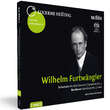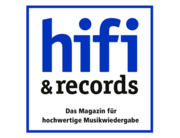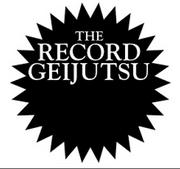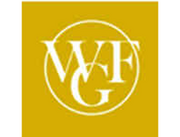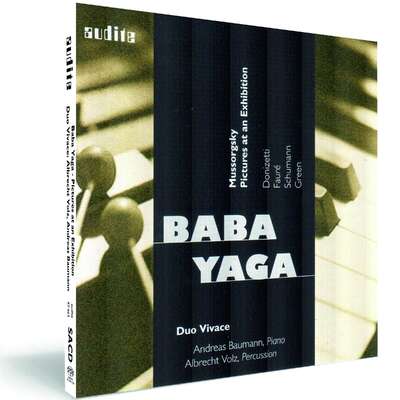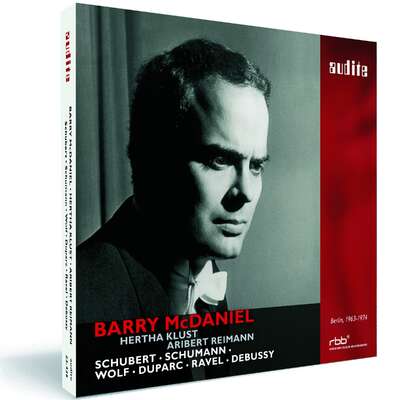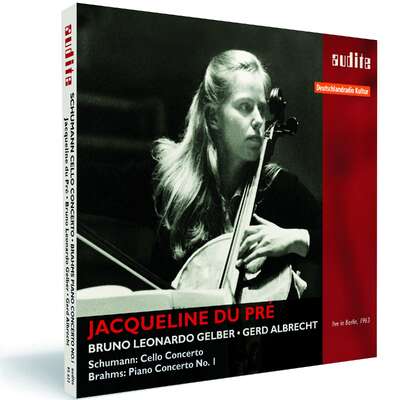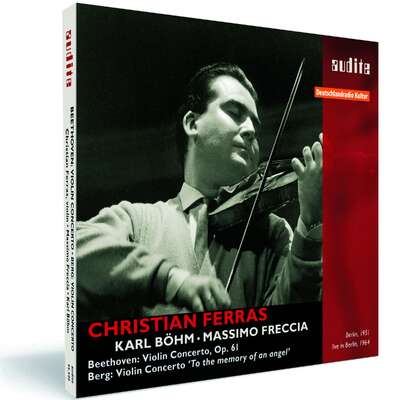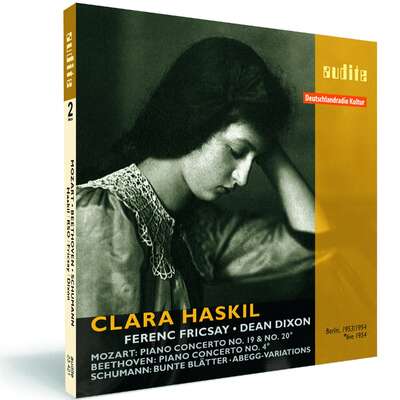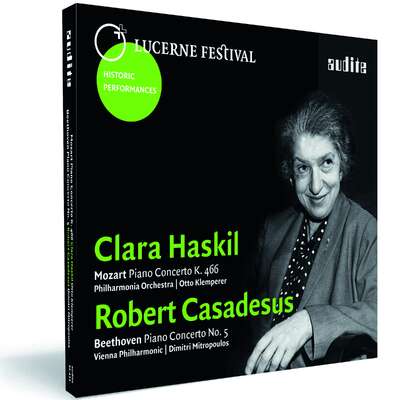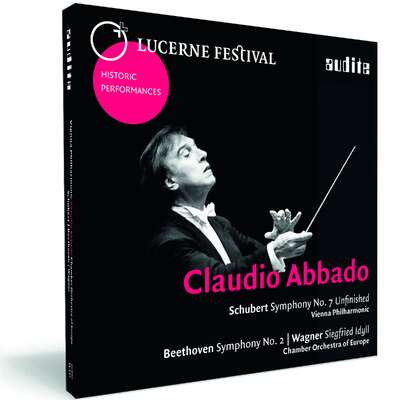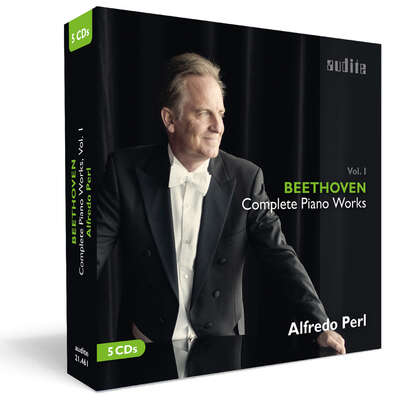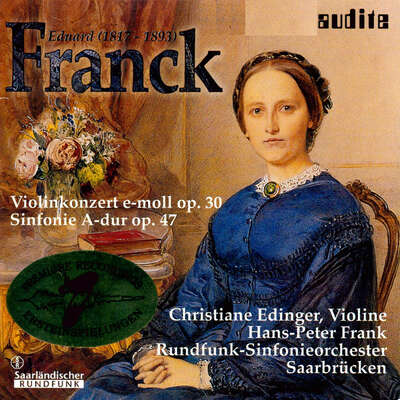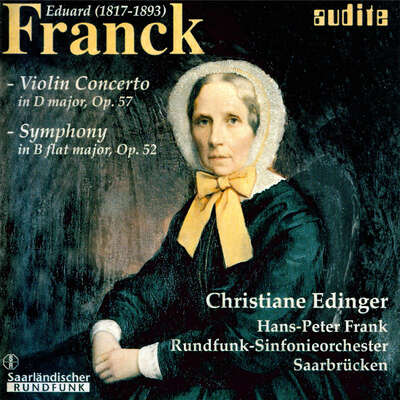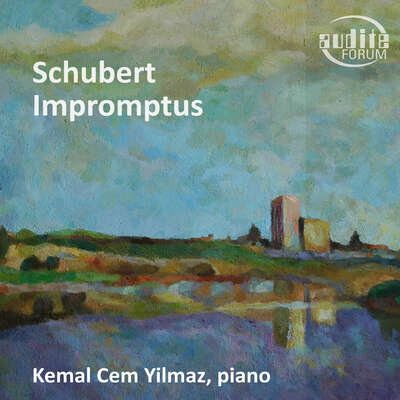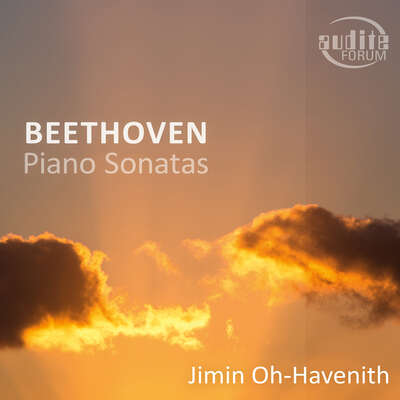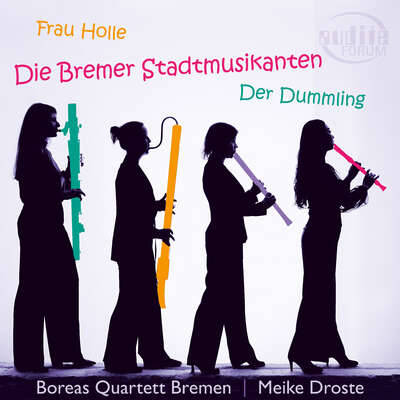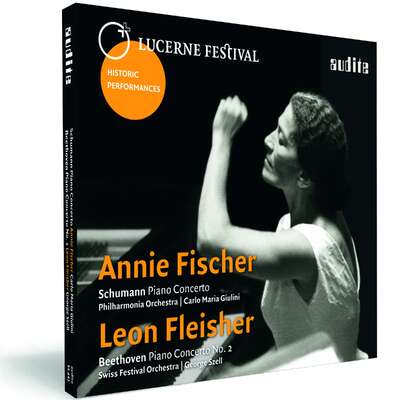
A sensational archive discovery and two of Furtwängler’s all-time favourites now also on SACD: a live recording of the Manfred Overture (1953), presumed lost until recently and released for the very first time on audite in November 2017, alongside Beethoven’s Eroica and Schumann’s Fourth Symphonies, remastered for the first time using the original tapes.more
"We are lucky to have this new addition to the discography of Furtwängler" (Wilhelm Furtwängler Journal)
Track List
Details
|
Wilhelm Furtwängler conducts Schumann & Beethoven
LUCERNE FESTIVAL Historic Performances, Vol. 12 |
|
| article number: | 91.441 |
|---|---|
| EAN barcode: | 4022143914415 |
| price group: | CL |
| release date: | 20. January 2018 |
| total time: | 97 min. |
Bonus Material
- digibooklet
-
Producer's comment
First-hand impressions of producer Ludger Böckenhoff [german]
Informationen
Furtwängler: First release of the lost Manfred Overture now also available on SACD
Volume 12 of the LUCERNE FESTIVAL edition presents a sensational archive discovery: a live recording of the Manfred Overture from the 1953 festival, presumed lost until recently and released for the very first time on audite in November 2017. In 1953, Furtwängler also conducted two of his all-time favourites, Beethoven's Eroica and Schumann's Fourth Symphonies. Until November 2017, these exciting interpretations were only available in technically flawed recordings made by enthusiasts. For the LUCERNE FESTIVAL edition, the newly rediscovered original tapes from the archives of the SRF Swiss Radio and Television were made available.
It is the desire of many Furtwängler fans to experience the atmosphere and aura of the performances also in the recordings to a maximum extend. This goal serves the current SACD with two additional tracks: The atmosphere of Furtwängler's stage appearance and applause, followed by increasing silence of the audience at the beginning of the works create special ambience and the air of a live performance.
Wilhelm Furtwängler, invited to Lucerne for the first time in 1944, was one of the defining artists of the LUCERNE FESTIVAL's first decades. From 1947, he performed in Lucerne each summer (with the exception of 1952, when he had to cancel due to illness) until his final concert in August 1954, a few months before his death (recording also available in the "Historic Performances" series: audite 95.641). In total, Furtwängler conducted eighteen of the festival's concerts, sixteen of which with the Swiss Festival Orchestra who also played on 26 August 1953.
Furtwängler's motto was to be "faithful to the spirit" rather than "faithful to each note". This Lucerne recording demonstrates his methodical approach, especially by means of a precisely calculated tempo architecture: Furtwängler's seemingly arbitrary tempo modifications hold structural significance, dynamising the musical form. Illustrated with numerous photos from the festival's archive, the 32-page booklet in three languages discusses this approach, whilst also referring to other famous recordings, such as Furtwängler's studio recording of Schumann's Fourth Symphony with the Berlin Philharmonic, made only a few months earlier.
In cooperation with audite, LUCERNE FESTIVAL presents outstanding concert recordings of artists who have shaped the festival throughout its history. The aim of this CD edition is to rediscover treasures - most of which have not been released previously - from the first six decades of the festival, which was founded in 1938 with a special gala concert conducted by Arturo Toscanini.These recordings have been made available by the archives of SRF Swiss Radio and Television, which has broadcast the Lucerne concerts from the outset. Carefully re-mastered and supplemented with photos and materials from the LUCERNE FESTIVAL archive, they represent a sonic history of the festival.
Reviews
Diapason | N° 675 Janvier 2019 | Patrick Szersnovicz | January 1, 2019
Schumann - Ouverture de Manfred
Le cas Furtwängler
[...] Abrupt et péremptoire à Leipzig, Abendroth mérite d’être connu pour le climat intense qu’il ménage sans interruption (Tahra, 1944).Mehr lesen
Classica – le meilleur de la musique classique & de la hi-fi | Numéro 202 - Mai 2018 | Yannick Millon | May 1, 2018
Un inédit de Furtwangler, voilà qui ne tombe pas du ciel tous les quatreMehr lesen
Gramophone | May 2018 | May 1, 2018
Another first release featuring a fêted maestro arrives via Audite as part of its Lucerne Festival series: Wilhelm Furtwängler conducts the SwissMehr lesen
www.classical.net | 11.04.2018 | José Luis Bermúdez | April 11, 2018 | source: http://www.class...
The result is extraordinarily good [...] All three pieces are played with Furtwängler's characteristic intensity and depth. [...] This is a must-buy disc for anyone seriously interested in the Romantic symphony.Mehr lesen
Stereo (Japan) | 2018.4 | April 1, 2018
Japanische Rezension siehe PDF!Mehr lesen
hifi & records | 2/2018 | Uwe Steiner | April 1, 2018
Auch mit diesen SACDs bestätigt Audite seine Vorrangstellung bei der Wiederveröffentlichung historischer Aufnahmen: Erstmals wurden die bekannten Luzerner Mitschnitte von Beethovens Eroica und Schumanns Dritter auf der Basis der originalen Rundfunkbänder und damit in deutlich besserer, wenn auch immer noch eher dokumentarischer Tonqualität ediert.Mehr lesen
BBC Music Magazine | 2/2018 | Erik Levi | April 1, 2018
Wilhelm Furtwängler's intellectually and emotionally penetrating Lucerne Festival Beethoven and Schumann performances (with the Swiss FestivalMehr lesen
www.ResMusica.com | Le 26 mars 2018 | Frédéric Muñoz | March 26, 2018 | source: http://www.resmu... Wilhelm Furtwängler au Festival de Lucerne
Le chef libère l’orchestre par de subtiles fluctuations de dynamique qui enflamment l’œuvre, offrant ainsi l’une des plus belles expressions du romantisme allemand. Grâce à une restitution sonore d’exception, chaque détail devient perceptible. À la suite de la SWF (Société Wilhelm Furtwängler) et d’autres éditeurs officiels (Tahra) proposant les meilleurs documents possibles, Audite s’inscrit dans ce petit cercle de producteurs épris d’excellence.Mehr lesen
Audiophile Audition | 21/03/2018 | Gary Lemco | March 21, 2018
What transcends the sum of the music’s collective parts lies in Furtwaengler’s capacity to evoke a sense of mysticism from the players, who generate a homogenous, intensely refined sound that the Audite personnel have captured with blazing authority.Mehr lesen
www.ClassicsToday.com | March 2018 | David Hurwitz | March 1, 2018
Furtwängler collectors will want this as a matter of course. Mehr lesen
www.classicalcdreview.com | March 2018 | R.E.B. | March 1, 2018 | source: http://www.class...
These are live recordings, and apparently this Manfed is here released for the first time.Mehr lesen
Der neue Merker | 28.02.2018 | Dr. Ingobert Waltenberger | February 28, 2018 | source: https://onlineme... Wilhelm Furtwängler: Konzertmitschnitt aus dem Kunsthaus Lucerne, 26. August 1953 mit der sensationellen Erstveröffentlichung von Robert Schumanns Manfred-Ouverture
In Zeiten oberflächlichen Marketingglanzes gerade im klassischen Musikbetrieb bietet das neue Audite-Doppelalbum jedoch eine unverzichtbare Hörerfahrung. So viel interpretatorischen Mut und künstlerisches Grenzgängertum haben nur ganz wenige Musiker zu bieten.Mehr lesen
www.musicweb-international.com | Tuesday February 20th | Jonathan Woolf | February 20, 2018
I last reviewed Furtwangler’s 26 August 1953 concert in Lucerne back in 2005 when the matter was complicated by virtue of Tahra’s inclusion ofMehr lesen
So, this Manfred sits alongside the live 1949 Berlin performance, and the 1951 Vienna studio inscription for EMI. It’s not wholly impeccable in terms of ensemble, even though the conductor had been coming to the Lucerne festival for almost a decade, first performing in 1944 and again in 1947 but it is powerful. Significantly he brought both symphonies on his first visit.
Furtwängler recorded Schumann’s Fourth Symphony commercially in Berlin in 1953. As for the Lucerne reading, there is again great power and direction and a sense of a huge organism running throughout. The buoyancy manifests itself in the Lebhaft and the sense of spiritual power that is evoked in the Langsam introduction of the finale is colossal. True there are numerous examples of tempo modifications and some will doubtless prefer greater weight of dynamics to the sense of elasticity Furtwängler indulges in. But the reasons for this level of metrical displacement are clear; this is a sometimes overwhelming reading that conjures up German Romanticism in all its tensile strength and fluid emotionalism.
There are numerous examples of his way with the Eroica. The wind chording is not always unanimous here but otherwise this is an impressive document. His way with the Funeral March is entirely characteristic; from a halting, almost reserved apologia to an overwhelming climax full of the bleakest foreboding.
There’s a good, succinct booklet with tape specifications and numerous photographs – including the orchestra, Furtwängler at play on the beach and at work with his orchestra. The uncredited man on the right-hand side on page 12 is surely Walter Legge.
The question is whether the advance in sound justifies purchase. If you don’t want to hear overloading and distortion, especially in the bass frequencies, and at shrill fff in both symphonies, you will welcome Audite’s work with its refinement and spatial depth. One can now appreciate the dynamic gradients in all their considerable glory and without peak distortion.
Diapason | N° 665 fevrier 2018 | Hugues Mousseau | February 1, 2018
Voici publiée pour la première fois l’intégralité du concert que Furtwängler donna le 26 août 1953, dans le cadre des Semaines musicalesMehr lesen
Le même constat s’impose pour la 4e de Schumann, d’un cantabile et d’une effusion certes irrésistibles, mais dans laquelle l’orchestre – em – mené par un Michel Schwalbé de trente-trois ans – ne semble pouvoir aller partout où Furtwängler aspire à l’entraîner. Manquent notamment ces imprévisibles et fatals coups de rein qu’y délivrait Berlin dans la version studio de 1951, où la transition conduisant au finale s’ouvrait tel un gouffre alors que nous demeurons ici tranquillement au bord du ravin. Par ailleurs, les scories instrumentales qui étaient à Berlin quantité négligeable passent ici moins bien.
Parmi les différentes « Eroica » de Furtwängler, celle de Lucerne n’est pas au nombre des plus indispensables. Les limites de l’orchestre suisse (le trio du Scherzo) concourent à mettre trop en avant le pathos qu’y insufflait le chef, à laisser même affleurer une lourdeur dont les versions viennoises de novembre 1952 et, surtout, décembre 1944 étaient exemptes.
Un détail convaincra certain(e)s d’acquérir à tout prix ce double album : dans le livret, deux clichés rarissimes montrent le maître en baignade, arborant, par un bel après-midi, le plus auguste et affriolant slip kangourou qui soit.
Crescendo | Februar-März 2018 | CK | February 1, 2018 Sensationsfund
Furtwängler näherte sich der Musik aus einer inneren Dringlichkeit heraus, die beim Anhören dieser Aufnahmen spürbar wird. Im Adagio-Satz der Schumann-Sinfonie beispielsweise brodeln Emotionen, die nie in übertriebenes Pathos münden. Ein empfehlenswertes Album, nicht nur für Furtwängler-Fans.Mehr lesen
Ongaku Gendai | 2018.2 | February 1, 2018
Japanische Rezension siehe PDF!Mehr lesen
Record Geijutsu | 2018.2 | February 1, 2018
Japanische Rezension siehe PDF!Mehr lesen
Wilhelm-Furtwängler-Gesellschaft
| 01.02.2018 | February 1, 2018 | source: http://www.furtw...
Sensationeller Archivfund
Furtwängler dirigiert Schumann und Beethoven in Luzern (1953)
Es fanden sich die bislang als verschollen geltenden Mitschnitte der Manfred-Ouvertüre von Schumann, dazu Beethovens Dritte Symphonie »Eroica« sowie die Vierte Symphonie von Schumann. Die beiden Symphonien sind Werke, die Wilhelm Furtwängler zeitlebens begleitet haben und eine zentrale Rolle in seinem Repertoire spielten. Die Mitschnitte aus dem Jahr 1953 erscheinen nun erstmals bei audite, von den Originalbändern editiert.Mehr lesen
Record Geijutsu | JAN.2018 | Masaki Yoshioka | January 1, 2018
Japanische Rezension siehe PDF!Mehr lesen
MJ | 18.1 | January 1, 2018
Japanische Rezension siehe PDF!Mehr lesen
www.opusklassiek.nl | december 2017 | Aart van der Wal | December 1, 2017
De door het Duitse label Audite uitgebrachte originele radiobanden (tot dan waren er alleen slecht klinkende privébanden van in omloop) van het concert dat Wilhelm Furtwängler op 26 augustus 1953 in Luzern in het kader van de daar gehouden jaarlijkse Festspiele dirigeerde, zal - in ieder geval qua klank - voor menige verzamelaar een ware verrassing zijn.Mehr lesen
Facebook | 23. November 2017 | Wilhelm Furtwängler Journal | November 23, 2017 | source: https://www.face...
The Audite SACD/CD (91.441) featuring a recording of the Schumann Manfred overture previously thought to have been lost, has arrived. This doubleMehr lesen
We are lucky to have this new addition to the discography of Furtwängler, as this Manfred overture is apparently finer than the other 2 extant recordings: the 18 Dec 1949 Berlin Iive and the 24 Jan 1952 Vienna studio. Here his rendition is more dramatic , with pulsating urgency intermingled with relaxing Iyricism.
The sound is good compared to previous releases of the Eroica and Schumann Symphony No. 4 in the same concert using a private amateur tape as the sound source, e.g. Tahra, Elaboration (thought to be pirate copies of the SWf CDs). It is full-bodied with a slight emphasis on the bass and quite prominent reverberations. The sound palette is quite different from that heard in the Tahra or Elaboration CDs. It is the interesting thing about historical recordings as the impressions on the music can be affected by the sound source, the remastering process and even the medium in which it is presented.
www.pizzicato.lu | 18/11/2017 | Remy Franck | November 18, 2017 Furtwängler in Luzern, 1953
Wilhelm Furtwänglers diverse Einspielungen der ‘Eroica’ u.a. aus Wien und Berlin weisen für die Sätze 1, 3 und 4 relativ konstante Tempi aus.Mehr lesen
1953 in Luzern war der Dirigent mit 16’31 am schnellsten im zweiten Satz. Überhaupt ist diese ‘Eroica’ für Furtwängler relativ frisch und zupackend in den Allegro-Sätzen. Aber welche Tiefe, welche zwingende intellektuell-emotionale Kraft erreicht er doch trotz nur 16’31 im Adagio assai…
Nicht weniger inspiriert und auch sehr dramatisch ist die Aufnahme der Vierten Symphonie von Robert Schumann.
Nun sind diese Aufnahmen zuvor schon bekannt gewesen, mit Ausnahme der ‘Manfred’-Ouvertüre, die lange als verloren galt und nun hier zum ersten Mal zu hören ist.
Die Tonqualität der von Audite bearbeiteten Aufnahmen ist allen anderen zuvor veröffentlichten Veröffentlichungen bei weitem überlegen. Tatsächlich wurden hierfür zum ersten Mal die Originalbänder des Schweizer Rundfunks benutzt, die anderen Verlegern nicht zur Verfügung standen. Der Klang hat dadurch viel mehr Relief und Korpus. Furtwängler-Sammler sollten diese neue Edition nicht verpassen.
Mostly well-known recordings with the Swiss Festival Orchester conducted by Wilhelm Furtwängler. The difference with former releases on other labels comes from the sound quality. Here, the original broadcast tapes have been used and remastered. The improvement is stunning…
Record Geijutsu | 2017.10 | October 1, 2017
Japanische Rezension siehe PDF!Mehr lesen
